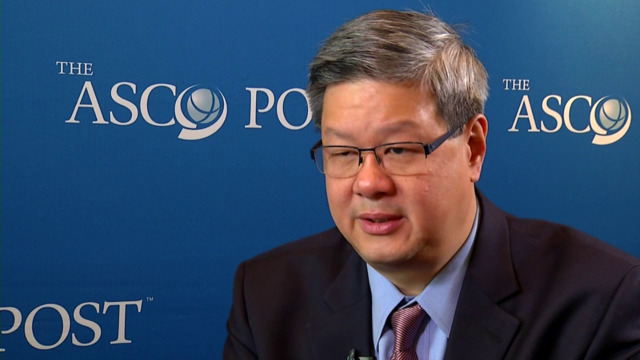Samuel M. Silver, MD, PhD, and Margaret A. Tempero, MD, on Multidisciplinary Management of Pancreatic Cancer
2015 NCCN Annual Conference
Samuel M. Silver, MD, PhD, of the University of Michigan Comprehensive Cancer Center, and Margaret A. Tempero, MD, of the UCSF Helen Diller Family Comprehensive Cancer Center, discuss drugs developed for hematologic malignancies that have activity in pancreatic cancer, vaccines, neoadjuvant treatment, and the need to focus on activated RAS.
Clifford Goodman, PhD, and Peter B. Bach, MD, MAPP
Clifford Goodman, PhD, of the The Lewin Group, and Peter B. Bach, MD, MAPP, of Memorial Sloan Kettering Cancer Center, discuss the affordability of cancer care, the “financial toxicities” of high drug prices, and what could and should be done about it.
Jerald P. Radich, MD
Jerald P. Radich, MD, of the Fred Hutchinson Cancer Research Center and Seattle Cancer Care Alliance discusses the evolution in treating and monitoring CML and whether monitoring at 3 and 6 months will ultimately prove useful.
Peter E. Clark, MD
Peter E. Clark, MD, of the Vanderbilt-Ingram Cancer Center discusses the highlights of the 2015 NCCN Guidelines for bladder cancer in both non–muscle invasive and muscle-invasive disease.
Wui-Jin Koh, MD
Wui-Jin Koh, MD, of the Fred Hutchinson Cancer Research Center and the Seattle Cancer Care Alliance, discusses the program to adapt NCCN guidelines to regions of the world with different resource availability. The first guideline to be adapted in this way is for cervical cancer, which is prevalent in the developing world.
John C. Grecula, MD
John C. Grecula, MD, of The Ohio State University Comprehensive Cancer Center and the James Cancer Hospital and Solove Research Institute, discusses the evolution of precision delivery of radiation for patients with small cell lung cancer and advances that include prophylactic cranial radiotherapy, thoracic radiotherapy, and the use of PET-CT.





